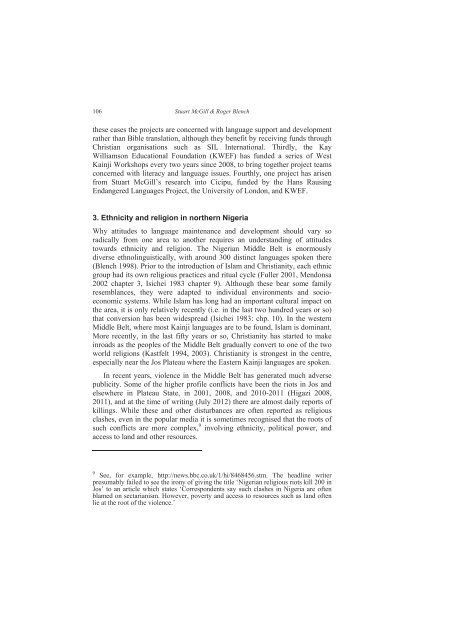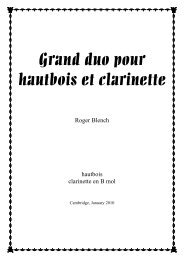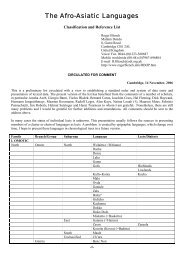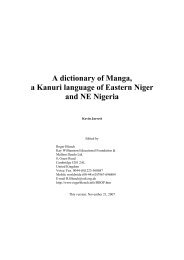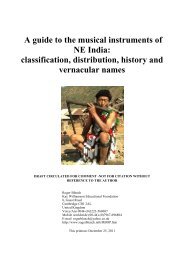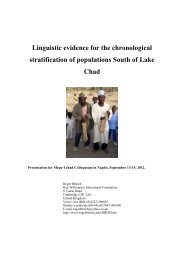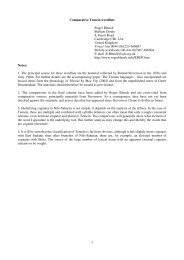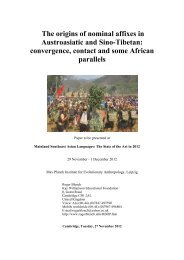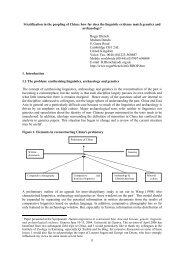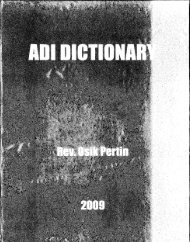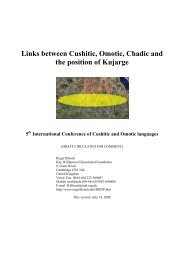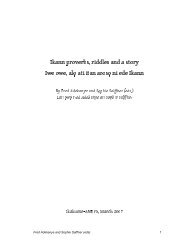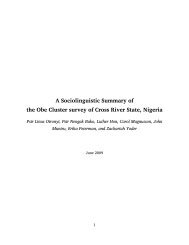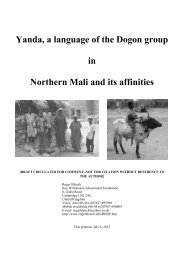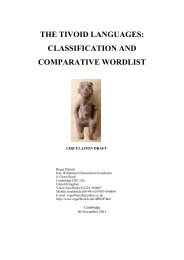Documentation, development, and ideology in the ... - Roger Blench
Documentation, development, and ideology in the ... - Roger Blench
Documentation, development, and ideology in the ... - Roger Blench
You also want an ePaper? Increase the reach of your titles
YUMPU automatically turns print PDFs into web optimized ePapers that Google loves.
106<br />
Stuart McGill & <strong>Roger</strong> <strong>Blench</strong><br />
<strong>the</strong>se cases <strong>the</strong> projects are concerned with language support <strong>and</strong> <strong>development</strong><br />
ra<strong>the</strong>r than Bible translation, although <strong>the</strong>y benefit by receiv<strong>in</strong>g funds through<br />
Christian organisations such as SIL International. Thirdly, <strong>the</strong> Kay<br />
Williamson Educational Foundation (KWEF) has funded a series of West<br />
Ka<strong>in</strong>ji Workshops every two years s<strong>in</strong>ce 2008, to br<strong>in</strong>g toge<strong>the</strong>r project teams<br />
concerned with literacy <strong>and</strong> language issues. Fourthly, one project has arisen<br />
from Stuart McGill’s research <strong>in</strong>to Cicipu, funded by <strong>the</strong> Hans Raus<strong>in</strong>g<br />
Endangered Languages Project, <strong>the</strong> University of London, <strong>and</strong> KWEF.<br />
3. Ethnicity <strong>and</strong> religion <strong>in</strong> nor<strong>the</strong>rn Nigeria<br />
Why attitudes to language ma<strong>in</strong>tenance <strong>and</strong> <strong>development</strong> should vary so<br />
radically from one area to ano<strong>the</strong>r requires an underst<strong>and</strong><strong>in</strong>g of attitudes<br />
towards ethnicity <strong>and</strong> religion. The Nigerian Middle Belt is enormously<br />
diverse ethnol<strong>in</strong>guistically, with around 300 dist<strong>in</strong>ct languages spoken <strong>the</strong>re<br />
(<strong>Blench</strong> 1998). Prior to <strong>the</strong> <strong>in</strong>troduction of Islam <strong>and</strong> Christianity, each ethnic<br />
group had its own religious practices <strong>and</strong> ritual cycle (Fuller 2001, Mendonsa<br />
2002 chapter 3, Isichei 1983 chapter 9). Although <strong>the</strong>se bear some family<br />
resemblances, <strong>the</strong>y were adapted to <strong>in</strong>dividual environments <strong>and</strong> socioeconomic<br />
systems. While Islam has long had an important cultural impact on<br />
<strong>the</strong> area, it is only relatively recently (i.e. <strong>in</strong> <strong>the</strong> last two hundred years or so)<br />
that conversion has been widespread (Isichei 1983: chp. 10). In <strong>the</strong> western<br />
Middle Belt, where most Ka<strong>in</strong>ji languages are to be found, Islam is dom<strong>in</strong>ant.<br />
More recently, <strong>in</strong> <strong>the</strong> last fifty years or so, Christianity has started to make<br />
<strong>in</strong>roads as <strong>the</strong> peoples of <strong>the</strong> Middle Belt gradually convert to one of <strong>the</strong> two<br />
world religions (Kastfelt 1994, 2003). Christianity is strongest <strong>in</strong> <strong>the</strong> centre,<br />
especially near <strong>the</strong> Jos Plateau where <strong>the</strong> Eastern Ka<strong>in</strong>ji languages are spoken.<br />
In recent years, violence <strong>in</strong> <strong>the</strong> Middle Belt has generated much adverse<br />
publicity. Some of <strong>the</strong> higher profile conflicts have been <strong>the</strong> riots <strong>in</strong> Jos <strong>and</strong><br />
elsewhere <strong>in</strong> Plateau State, <strong>in</strong> 2001, 2008, <strong>and</strong> 2010-2011 (Higazi 2008,<br />
2011), <strong>and</strong> at <strong>the</strong> time of writ<strong>in</strong>g (July 2012) <strong>the</strong>re are almost daily reports of<br />
kill<strong>in</strong>gs. While <strong>the</strong>se <strong>and</strong> o<strong>the</strong>r disturbances are often reported as religious<br />
clashes, even <strong>in</strong> <strong>the</strong> popular media it is sometimes recognised that <strong>the</strong> roots of<br />
such conflicts are more complex, 9 <strong>in</strong>volv<strong>in</strong>g ethnicity, political power, <strong>and</strong><br />
access to l<strong>and</strong> <strong>and</strong> o<strong>the</strong>r resources.<br />
9 See, for example, http://news.bbc.co.uk/1/hi/8468456.stm. The headl<strong>in</strong>e writer<br />
presumably failed to see <strong>the</strong> irony of giv<strong>in</strong>g <strong>the</strong> title ‘Nigerian religious riots kill 200 <strong>in</strong><br />
Jos’ to an article which states ‘Correspondents say such clashes <strong>in</strong> Nigeria are often<br />
blamed on sectarianism. However, poverty <strong>and</strong> access to resources such as l<strong>and</strong> often<br />
lie at <strong>the</strong> root of <strong>the</strong> violence.’


